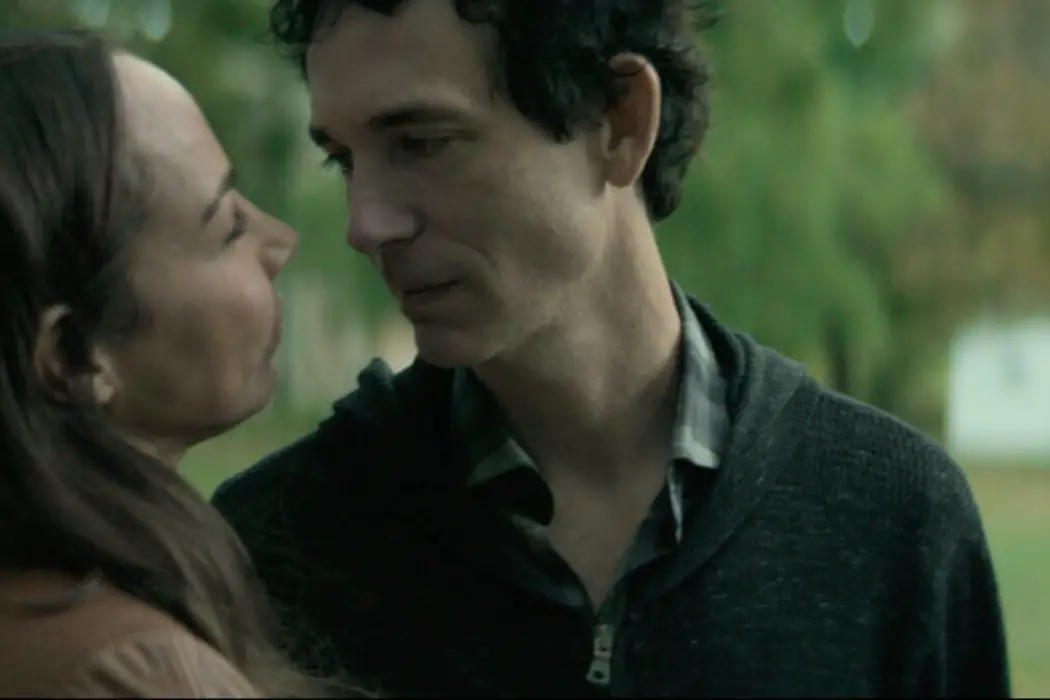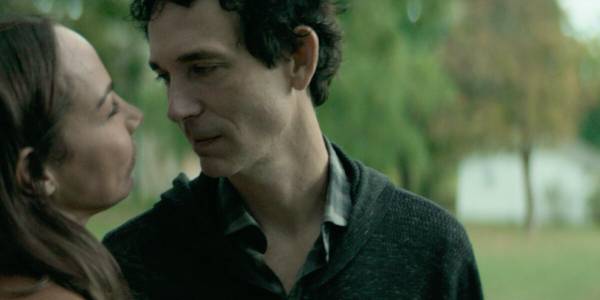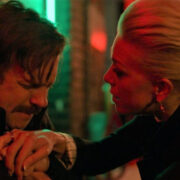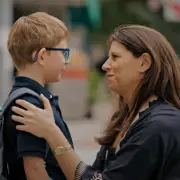“I Always Wanna End With A Glimmer Of Hope”: Interview With The Cast Of ASHGROVE

Former film student from Scotland turned writer and film reviewer.
“Oh, I hate when that happens”, Amanda Brugel says when I recount my tale of the Uber driver that morning who insisted the Covid vaccine was part of a global conspiracy to manufacture another AIDS epidemic. “I just agree with them and nod my head”. Our talk of anti-vaxxers leads director Jeremy LaLonde to discuss the Canadian Trucker Crisis – “It’s human nature to create more drama!”
It seems impossible to turn on the TV without hearing another news story with global implications, and with it more opinions and theories about what it all means. I’m meeting with LaLonde, Brugel, and Jonas Chernick to discuss their new feature Ashgrove, a fable set in the near future where the world’s water supply is slowly becoming toxic. Ashgrove stars Brugel as Jennifer, a scientist on the brink of discovering the solution to the crisis who is also navigating a stormy marriage to Jason (Chernick). Together, and with another couple, Sammy (Natalie Brown) and Elliot (Shawn Doyle), they retreat to an idyllic farm called Ashgrove to try and repair their relationship before it’s too late.
While I set up, we discuss my unusual Uber trip, the Canadian trucker crisis, and the state of the world at large. It feels timely to be having this discussion now, since the overall concept of Ashgrove is finding love and humanity amidst the turmoil and brutality of a crisis.
Our conversation turns out to be a lively one – it is obvious how close the team of Ashgrove are; throughout the interview they finish each other’s sentences, add to a story or reminisce about a scene. When they do so, they seem to do it as one unit. It feels less like an interview and more like a conversation you’d have with a group of friends about what they did for their summer holidays.
Daryl MacDonald for Film Inquiry: So Ashgrove is very different from your previous movie James vs His Future Self. That movie was more comedic, more light-hearted. Was it a conscious decision to move away from that to a more sombre tone with Ashgrove?
Jeremy LaLonde: Well, Jonas and I have built our careers around comedies. It’s sort of what we’re known for. We know how to do that and it just doesn’t feel challenging in the way that I continually want to be challenged by each new project I take on. So we asked ourselves what was the hardest thing we could do. The thing that’s most different from what we had done previously.
Jonas Chernick: So I pitched Jeremy on a really quiet, intimate character study. Two actors in a room just devouring the story and really examining humanity and relationships. Scenes From a Marriage kinda thing.
Jeremy LaLonde: And I said yeah that’s great, I love that… but the stakes have to be the end of the world. [laughs] Coz, you know, that’s interesting… but only if you have a really great hook, otherwise you’re just watching scene chewing for an hour and a half, which I think most people would be in for, but only if you can trick them into watching that. So, for me, we have to have cataclysmic stakes and at first Jonas thought that was insane…
Jonas Chernick: Because that’s not what I was going for! I wanted quiet, you know? But I quickly realised that you can do both, it’s that microcosmic examination, right?
Jeremy LaLonde: Yeah because the world ending is sort of a metaphor for their relationship ending.
Jonas Chernick: Exactly, so then it became a fun conversation about what’s our apocalypse? Is it zombies, aliens?
Jeremy LaLonde: Similar in the way to how we approached James vs His Future Self, we don’t have the budget to make a Back To The Future, but what’s our version of that? I’m not Roland Emmerich or Michael Bay, so what’s our version of that? And this is what we got.
Jonas Chernick: We loved this paradox of water being the thing we need for survival, but it’s the very thing that’s killing us. And it’s an amazing metaphor for love and toxicity and relationships. We need each other, we strive for connection, but ultimately that’s the thing that turns toxic and ends up killing us from the inside out.

Pandemic
Your work together is very much drawn to that idea, isn’t it? What I liked about James vs His Future Self was that it’s ostensibly a high-concept time travel comedy, but when it comes down to it it’s a relationship drama about a guy struggling to connect with people. It’s like you use the concept as window-dressing, but the real stuff is underneath that.
Jeremy LaLonde: Yeah, we like to trick people. [laughs] It’s interesting that when we first started talking about Ashgrove it was September 2019.
Wait, so it was before Covid?
Jeremy LaLonde: Oh yeah, Covid wasn’t anything. It was a whisper on people’s lips! So as it was happening we were able to draw from our lives and our own experience of the pressures that get put on people who’re trying to solve the problem, and that was the big inspiration for Amanda’s character. So as we’re talking this idea through, we decided we wanted to approach this not with a script but instead a very intense outline.
We also wanted to do a similar approach to how someone like Mike Leigh makes his movies, like as opposed to writing the film from scratch we thought, let’s write a list of all the actors we’d love to work with, and see who we can get, and then develop the characters and story with them. From the get-go the rule was that everyone has to approach this knowing they can fail. We can push hard and swing for the fences and if things don’t work out, that’s okay. So the first person on our list to collaborate with was Amanda.
It’s interesting you mentioned Mike Leigh. He’s well known for a sort of naturalistic, semi-improvised style. Is that what you did here?
Jonas Chernick: There was lots of improv yeah, because we wrote the outline but when we were shooting it we’d go off-script. We’d shoot the scene and then Jeremy would give us entirely different directives and then we’d just take it where it went. We also played with the idea of characters having secrets and the other actors not knowing those secrets.
Amanda Brugel: Jeremy had a really specific set of hand signals for each character – my character did not receive any hand signals – and it really forced all of us to be present, because we knew something was coming, we just didn’t necessarily know what it was. We did have, like Jeremy said, a loose outline, but suddenly he would throw up a hand signal and I’d have no idea what would unfold in the scene. Would it be a dramatic take? Would there be comedic moments? Would someone be even angrier than necessary? So it forced all of us to be incredibly present and not take a single moment for granted, because you were just bracing to receive whatever your scene partner’s gonna give you, which is a really cool and unusual way of working. Actors don’t really do that. We become sort of complacent. I’ve never had a project where I’m bracing!
Jonas Chernick: And Jeremy structured it in such a way that Amanda’s character’s paranoia could be real. [laughs] Because Amanda didn’t know at any given time what was going to come at her in a scene.
Amanda Brugel: Or who!
Jonas Chernick: Yeah!
Amanda Brugel: I knew who was cast but I didn’t know in what form they’d show up.
That really changes how I think about some of the scenes you shot! Like, the scene where the two couples sit down and play a quiz game to see who knows each other the best. Man, that was so tense!
Jeremy LaLonde: So what I did for that scene was I gave the cast a bunch of questions that could pop up and I had them all email me their answers, and then I took the answers and I emailed the cast back with a list of answers for the other characters so they could memorise them and know the answers during the game. But, because some of these people haven’t spent a lot of time together recently…
Jonas Chernick: He f*cked with us.
Jeremy LaLonde: Well, I didn’t always give them the right answer! Because maybe things have changed over time [in the relationship] and the other person hasn’t noticed. So that way they would confidently give a different answer and have a real reaction on screen, and to live in that frustration as a human being if you thought your partner’s favourite thing was whatever and it turns out you actually don’t know your partner as well as you thought you did.
Amanda Brugel: I was so confused during shooting! [laughs] I thought my memorisation skills were off. I know that I memorised the right answers! But they were the wrong answers. So to say the answer with such conviction and have it blow up in your face on camera, it creates a very real moment.
Jeremy LaLonde: [To Brugel] Well, you in particular had this level of embarrassment-
Amanda Brugel: Yes.
Jeremy LaLonde: – where you feel that whole thing, it’s in the movie, where you’re like “okay, you tell me!”
Jonas Chernick: So we structured a lot of the shoot in this way, where we would be able to play these kinds of games as actors and characters. This is what we were saying about taking a risk, it’s so different from the way we shot James vs His Future Self, which we worked on that script for a very long time. Here, Jeremy knew every single beat that was gonna happen in the movie, he just didn’t know how we were gonna get there, so there was freedom for us to rebuild it as we were going through.
Jeremy LaLonde: And because we were shooting chronologically, every night I could tweak where I wanted it to shift based on what happened that day. I could come up with a new call back when something came up, like: that’s really interesting, I want to do something later with that.
Water Troubles
How did you find that location? It’s a really beautiful farm, very peaceful and serene.
Jeremy LaLonde: I’m lucky enough that that’s in my family. That’s my wife’s family’s old farm house, they’ve had it for two centuries. So when we were talking about this movie, I thought, I don’t want to do this in a room. I think, if we’re going to do something that’s a chamber piece, let’s at least do it in a location that offers a lot of visuals, right. What’s great about the farm is that the house itself is fairly large and you have all these rooms, but the exteriors also offer a lot of options too. Because water is such a heavy theme in the movie, there’s the river right beside it too and I thought, I’d love to do a scene in the river.
Amanda Brugel: Literally.
Jeremy LaLonde: Yeah, literally on the river. And so what I loved about that is that even though 90% of the movie takes place at the farm, it doesn’t feel like it’s claustrophobic, except for when we want it to be.
It must have been so peaceful filming there, while the pandemic is sort of raging on around the world. You’re kind of isolated from that.
Jonas Chernick: It was the first time – because it was shot in December 2020 – that any of us had been in a group setting since March. So all of a sudden we were all together for a couple of weeks and it was incredibly scary at first, and weird, and then so wonderful just to have that feeling of community and to be with other people. So it was very much a release for us.
Jeremy LaLonde: Yeah, I like to think it was a very relaxed shoot. We shot the movie in 10 days, in chronological order, and we all embraced the style we were going for, so with the exception of one day that was very stressful, we so-
Amanda Brugel: [smiles knowingly] Why Jeremy? Why was it stressful?

Jeremy LaLonde: Uh, well on the second day of our shoot I thought it would be a great idea not only to shoot them [Brugel and Chernick] canoeing in the river, but that we should throw the camera in another canoe and follow them along. And… we… dumped the camera in the river.
Oh my God…
Jonas Chernick: The canoe capsized and a $150,000 camera went right into the river.
Jeremy LaLonde: You’re not supposed to do that with cameras!
Jonas Chernick: Yeah, cameras don’t like water…
Jeremy LaLonde: Even though it was only in for like a second, it was enough. So we spent the whole day waiting to see if our insurance company would convince our camera company to give us another camera.
Jonas Chernick: We thought we’d lose the whole movie.
Amanda Brugel: It was kinda great though because it really did unify us. Because we were working so unconventionally we just put no pressure on ourselves. Like Jeremy said, we can fail, and we really did refer to it as an experiment the whole time. So without the looming idea that we had to be perfect, we had to finish the film, we have to make something, it sort of was… part of…
Jonas Chernick: The process.
Amanda Brugel: The process. It was definitely a surprise, there was a lot of surprises in the movie. This was just one more.
Jeremy LaLonde: That was a surprise for me!
Ukulele
So, I’m the kind of person who will wake up one day and decide I want to learn the ukulele. Which I did a few years ago! I went out, bought a ukulele and a beginner’s guide and tried to learn. So I was really excited to see Jonas play the ukulele in this movie! How did that come about?
Jonas Chernick: [laughs] I am so glad you asked me that, Daryl.
Jeremy LaLonde: He’s been waiting for this question for years!
Jonas Chernick: First week of lockdown my wife says “let’s use this time. We might be here for a few days, let’s learn something!” So we have two daughters, nine and twelve, and we ordered four ukuleles – two small ones for the girls and two regular ones for us.
You could’ve been like a travelling family band.
Jonas Chernick: Yeah! And so we put on this YouTube video about how to learn a ukulele, did one class, and the girls were like “I’m done!” and now those ukuleles are in a pile somewhere in the house but I was like “I’m gonna roll with this!” because I love music, so I just kept on it and the first five months was me learning every chord and I learned like 40 songs. It became my morning ritual; wake up in the morning, have my coffee, and review all my songs and try to learn fingerpicking. So when we were shooting I said “oh we should get this in the movie!” So the song you hear in the movie is actually improvised.
Wow, that’s amazing.
Jonas Chernick: Not on camera, we figured it out while we were waiting for the camera.
Jeremy LaLonde: Yeah, it was the same day we did the canoeing in the river! We sat in a hammock.
Brugel: I went home, fixed up my poison ivy, and they wrote the canoe song.
Jeremy LaLonde: To give credit, the song was written by our com-
Jonas Chernick: The music!
Jeremy LaLonde: The music was written by our composer Ian LeFeuvre, he kinda wrote us the thing so Jonas wouldn’t be tasked-
Jonas Chernick: Well, he taught me the chords and the melody and then I made up the words, but the music was actually written by Ian.

Jeremy LaLonde: We were gonna stumble through creating lyrics on camera but because we knew our day was gonna be compressed, we decided to do a first pass and see what comes on the day. We did do a little bit of prep.
Jonas Chernick: Thank you for asking me about my ukulele. You’ve made my day!
Jeremy LaLonde: No one has asked us about that before!
Amanda, I was first aware of you as a comedy actor in shows such as Kim’s Convenience and Workin’ Moms. Then you went on to do The Handmaid’s Tale, and now this. Do you specifically choose which genre you want to go in for, or does it all depend on the script?
Amanda Brugel: It’s very, very intentional. Depending on what my last job was I try to go in the complete opposite direction. Twenty years ago when I first started, there wasn’t a whole lot of opportunities for women of colour to be regulars on a series or to be in both comedy and drama. You sort of just got placed in one and that’s it – usually in comedy as the fun sidekick/best friend. I didn’t want that. So from the beginning my agent and I set out to constantly switch up what I was doing to sort of trick people into having to watch me, and therefore I have a lot of opportunities presented to me because people don’t want to just put me in a box. So this was a beautiful thing because it’s the first time I’ve been able to lead a feature, and it’s also with Jeremy and Jonas, who I respect. It was very enticing to come on board to something where I was going to have control over the character, the back-story, the freedom to play and collaborate with gorgeous people like Natalie Brown.
Jennifer struck me as a very conflicted person. She’s the only one who can save the world at this point, but she’s also trying to save her marriage and figure all that out. What did you see as the most important aspect of Jennifer when you were getting into the character?
Amanda Brugel: I saw a lot of myself in her. The most important aspect was to show a woman who was obsessed with work and who makes a lot of difficult choices because she’s so in love with her job. You see a lot of men do that, you don’t see a lot of women do that. I can really relate to that part of her. Ultimately, though, choosing love was the thing that was the most important to me because I feel like that’s who I am… hopefully!
Okay guys, it has been an absolute pleasure talking to you. I just have one final question: what do you want people to take away from this movie after the credits roll?
Jonas Chernick: It’s hope, for me.
Jeremy LaLonde: Yeah. The thing about all my movies is that I’m just not a cynic. I like to dabble in cynicism but I always wanna end with a glimmer of hope, because I think that’s all we can do. Especially in a time like this. We didn’t set out to make a movie about the pandemic, but every day I walked away thinking as long as I know that other people are dealing with this and that I can feel connected to other people, I’m okay. So my hope for this is that people watch it and go, oh right I’m not the only one having relationship challenges during the worst time in our history, and that we’re all gonna be fine if we can just keep the right outlook.
Film Inquiry would like to thank the cast and crew of Ashgrove for speaking with us.
Does content like this matter to you?
Become a Member and support film journalism. Unlock access to all of Film Inquiry`s great articles. Join a community of like-minded readers who are passionate about cinema - get access to our private members Network, give back to independent filmmakers, and more.










